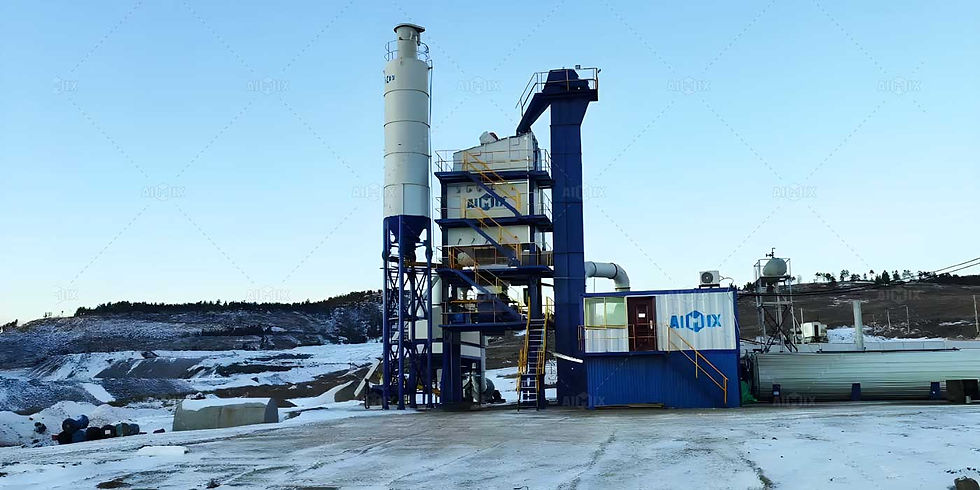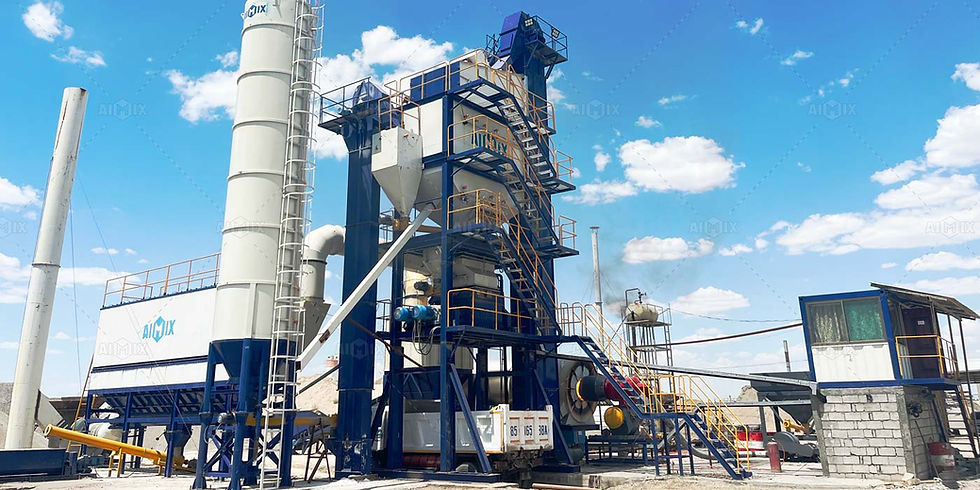What Are the Key Differences Between Continuous and Batch Asphalt Mixing Plants for Bridge Construction?
- aimixglobal5
- Aug 30, 2024
- 4 min read
When it comes to bridge construction, the choice of asphalt mixing plant plays a crucial role in the quality and efficiency of the project. Understanding the key differences between continuous and batch asphalt mixing plants can help engineers and contractors make informed decisions. In this article, we’ll explore these differences and how each type of asphalt plant impacts bridge construction projects.

Understanding Continuous Asphalt Mixing Plants
Continuous asphalt mixing plants, also known as drum mix plants, operate on a continuous production cycle. The drum mix asphalt plant is designed for large-scale projects where high production rates are required. In a continuous plant, the aggregate is fed into a rotating drum, where it is dried, heated, and mixed with liquid asphalt. The finished asphalt mix is then discharged continuously from the drum.
One of the key advantages of continuous asphalt mixing plants is their ability to produce large quantities of asphalt mix without interruption. This makes them ideal for projects that require consistent output, such as highway or large-scale bridge construction. Moreover, continuous plants are often more cost-effective due to their simplified design and lower operational costs.
Efficiency and Consistency in Continuous Plants
Continuous asphalt mixing plants are known for their efficiency. Since the production process is continuous, there is less downtime, and the plant can operate for extended periods. This results in higher productivity and lower operating costs. The consistency of the asphalt mix produced by continuous plants is also a significant advantage. The uniformity of the mix is maintained throughout the production process, ensuring that the final product meets the required specifications for bridge construction.

Exploring Batch Asphalt Mixing Plants
Batch asphalt mixing plants, also known as asphalt batch plants, operate on a batch production cycle. In this process, the aggregate is fed into a series of chambers where it is dried, heated, and mixed with liquid asphalt. Each batch of asphalt mix is produced separately, allowing for greater control over the mix design and quality.
Batch plants are ideal for projects that require a high degree of precision, such as complex bridge construction projects. The batch type asphalt plant offers greater flexibility in terms of mix design, allowing engineers to adjust the asphalt mix to meet specific project requirements. Additionally, batch plants can produce smaller quantities of asphalt mix, making them suitable for projects with varying production needs.
Precision and Flexibility in Batch Plants
The primary advantage of batch asphalt mixing plants is their ability to produce highly precise asphalt mixes. Since each batch is produced separately, engineers can easily adjust the mix design to meet specific project requirements. This flexibility is particularly valuable in bridge construction, where the asphalt mix must meet strict performance standards. Batch plants also allow for the production of different asphalt mixes within the same project, providing further flexibility for complex bridge construction projects.

Comparing Operational Costs
When it comes to operational costs, continuous asphalt mixing plants generally have lower costs compared to batch plants. The continuous production process requires fewer moving parts and less maintenance, reducing overall operational expenses. However, batch plants may incur higher operational costs due to the complexity of the production process and the need for more frequent maintenance.
Despite the higher operational costs, batch plants offer greater control over the quality of the asphalt mix, which can lead to better long-term performance in bridge construction projects. The decision between a continuous or batch plant ultimately depends on the specific needs of the project, including budget, production requirements, and quality standards.
Impact on Project Timelines
The choice between continuous and batch asphalt mixing plants can significantly impact project timelines. Continuous plants, with their ability to produce asphalt mix without interruption, are well-suited for projects with tight deadlines. The consistent output of these plants helps ensure that construction schedules are met, reducing the risk of delays.
On the other hand, batch plants may have longer production cycles due to the need to produce each batch separately. However, the ability to produce high-quality, precise asphalt mixes can offset the longer production times, especially in projects where mix quality is critical, such as in bridge construction. The choice between continuous and batch plants should consider both the timeline and the quality requirements of the project.

Environmental Considerations
Environmental impact is another factor to consider when choosing between continuous and batch asphalt mixing plants. Continuous plants generally have a smaller environmental footprint due to their streamlined production process. The continuous production cycle results in fewer emissions and lower energy consumption, making them a more environmentally friendly option for large-scale projects.
Batch plants, while offering greater control over the mix design, may produce more emissions due to the start-stop nature of the batch production process. However, advances in technology have led to the development of more environmentally friendly batch plants, with features such as improved dust collection systems and energy-efficient burners. When selecting an asphalt plant for bridge construction, it is important to consider the environmental impact of the plant and its compliance with local regulations.
Conclusion: Choosing the Right Asphalt Plant for Bridge Construction
In conclusion, the choice between continuous and batch asphalt mixing plants depends on the specific needs of the bridge construction project. Continuous plants offer high efficiency, lower operational costs, and consistent output, making them ideal for large-scale projects with tight deadlines. Batch plants, on the other hand, provide greater control over the mix design, making them suitable for complex projects that require high precision.
When considering your options, it’s important to weigh the benefits of each type of plant against the specific requirements of your project. Whether you need the efficiency of a continuous asphalt mixer plant or the precision of a batch asphalt plant, AIMIX, as an outstanding plant exporter offers a range of asphalt manufacturing plants designed to meet the demands of bridge construction projects. With a commitment to quality and innovation, AIMIX provides reliable solutions that ensure the success of your construction projects.



Comments